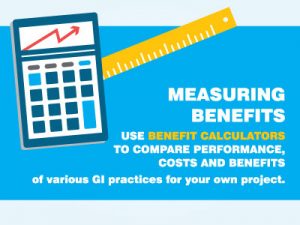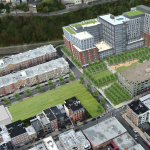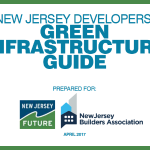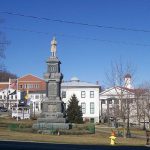New Jersey Future Blog
Exploring Green Infrastructure Options for Your Project? These Tools Can Help.
May 1st, 2018 by New Jersey Future staff
This article was written by Elise Eggert-Crowe from Meliora Design, and is derived from a longer report commissioned by New Jersey Future and prepared by Meliora Design.
 Many tools exist that can help both the technical and non-technical communities understand how green infrastructure practices fit into a development project. While these may not act as a substitute for full design, they can be powerful tools in the site planning process and capture many of the essential components of a site-level design that is required to implement stormwater management.
Many tools exist that can help both the technical and non-technical communities understand how green infrastructure practices fit into a development project. While these may not act as a substitute for full design, they can be powerful tools in the site planning process and capture many of the essential components of a site-level design that is required to implement stormwater management.
The following four tools demonstrate green infrastructure options for a development site, which can be especially useful in the planning stage of a project. Many of the tools have overlapping features, which are summarized in Table 1. While all tools provide an overview of the impact of development on stormwater infrastructure, each site is likely to present a unique list of challenges that requires in-depth analysis and expertise.
For those looking for a way to demonstrate green infrastructure options for a development site, consider the benefits of the following tools:
- National Green Values Calculator
This tool was developed by the Center for Neighborhood Technology in collaboration with the U.S. Environmental Protection Agency’s Office of Wetlands, Oceans, and Watersheds. It aligns with methodology used for many regulatory requirements and provides a quick way to compare pre-development and post-development conditions using both conventional and various green infrastructure improvements. Additionally, the tool displays construction costs, maintenance costs, and additional environmental benefits. The National Green Values Calculator appears to be the most useful planning tool for developers, especially in the early project planning stages when decisions are made regarding green versus gray infrastructure. - EPA National Stormwater Calculator
The purpose of this tool, developed by the U.S. Environmental Protection Agency, is to inform the user about how a development project meets a stormwater retention target based on location-specific inputs. The tool is free to use and offers a range of low-impact development practices that the user can model by modifying basic design properties. The tool also offers construction and maintenance cost estimates, which can be useful in informing development design. The tool may be useful for early‐stage planning applications or conceptual‐level site development but is not likely to provide the technical specificity or flexibility that developers would need to implement green infrastructure. - NYC Green Infrastructure Co-Benefits Calculator
The Co-Benefits Calculator is a free tool developed by the New York City Department of Environmental Protection and allows the user to quantify and compare costs and co-benefits of common green infrastructure used in New York City. By altering some parameters, it may be useful outside of New York City. A few examples of co-benefits captured by the tool include increased property value, improved quality of life, carbon sequestration, and supported green jobs. - Autocase
This software was developed with the goal of optimizing lifecycle costs of a project. In focusing on a lifecycle cost analysis that incorporates not only economic but also social and environmental factors, Autocase presents a holistic approach which may help justify the costs of green infrastructure over traditional gray infrastructure. The software allows the user to input site-specific design information and pulls from compiled database information (e.g., Census information, meteorological data, etc.). This software also offers a concise way to communicate the many goals of green infrastructure techniques. The software appears to be helpful mostly to planners or community organizers, since it does not address specific regulatory requirements at the state, county, or municipal level that influence what developers build. Autocase pricing varies depending on license terms; most users pay $5,000 for an annual license.
Common features of green infrastructure tools
| Feature / Tool |
Autocase |
EPA National Stormwater Calculator | NYC Green Infrastructure Co-Benefits Calculator |
National Green Values Calculator |
| Estimates Construction Costs |
● |
● | ● |
● |
| Estimates Maintenance Costs |
● |
● | ● |
● |
| Estimates Economic Costs/Benefits (Beyond Green Feature Installation) |
● |
● |
|
|
| Estimates Environmental Costs/Benefits |
● |
● |
● |
|
| Estimates Social Costs/Benefits |
● |
● |
|
|
| Allows for User-Input Location |
● |
● |
● |
|
| Contains Location-Specific Rainfall/Soil Data |
● |
● |
● |
|
| Contains A Variety of GI Practices |
● |
● | ● |
● |
| Allows for Customization of GI Practices |
● |
● |
● |
|
| Aligns with Regulatory Requirements |
|
● |
||
| Free Tool |
|
● | ● |
● |
You can learn more about each of these tools from the author’s presentation during the “Green Stormwater Infrastructure Consulting: Chat with the Experts” seminar at the Atlantic Builders Convention on Wednesday, April 11, 2018.
About the Author
As a water resources designer with Meliora Design, Elise Eggert-Crowe provides site design, stormwater management design, hydrologic modeling, and permitting services. She is passionate about providing sustainable and effective stormwater management solutions that are integrated cohesively into site design. Elise’s professional experiences include land development plan preparation with a civil engineering firm and stormwater permitting with the City of Philadelphia.
About Meliora Design
An award-winning engineering firm founded in 2007, Meliora Design specializes in civil, structural, and water resources engineering with a focus on sustainable site design and water resources management. Meliora values an integrated design process to reach creative and cost-effective solutions. Meliora Design is a registered Woman’s Business Enterprise (WBE) in New Jersey, Delaware, Georgia, New York, Ohio, and Pennsylvania and the City of Philadelphia.
















